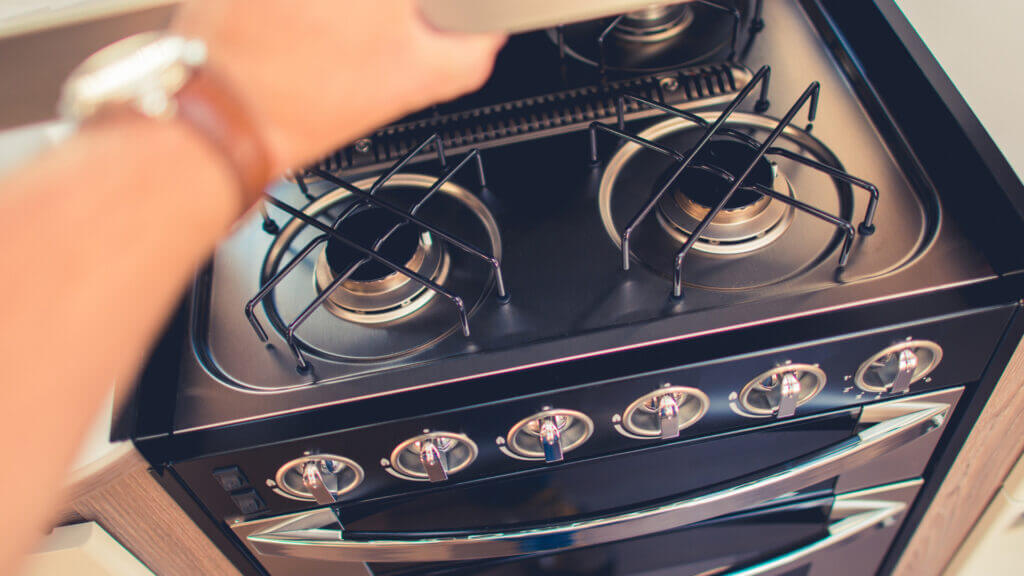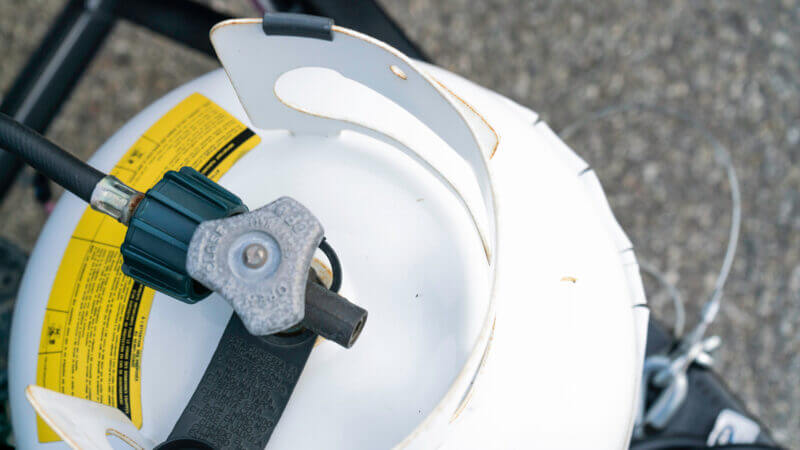Table of Contents Show
Non-RVers may be most familiar with propane from summer cookouts, but an RV propane system offers a lot more than a grill. This versatile fuel often powers several crucial components of your rig. Let’s take a closer look!
What Does an RV Propane System Do?
Your RV propane system is the power behind several other systems that make life in your rig comfortable. Generally, your propane system will provide cooking fuel for your kitchen as well as fuel for your furnace, refrigerator cooling system, and water heater. You’ll store propane in a tank on or inside your rig in highly pressurized liquid form. It’s released through a regulator and boils into vapor for use in various appliances.
How a Motorhome Propane System Works
Motorhome propane systems generally use built-in ASME propane tanks. These tanks hold the larger amounts of propane needed by Class A, B, and C RVs. From the tank, propane flows directly through an adapter valve into a regulator. This device ensures the propane is at a pressure that can be used safely by your appliances. From the regulator, a supply hose will connect to your RV propane system. Your propane lines will snake through your rig to your range, water heater, and other appliances from this one central access point.
How a Travel Trailer Propane System Works
In contrast to motorhomes, travel trailers generally use exterior-mounted, removable DOT propane cylinders. Depending on the size of the trailer, you may be able to use two tanks. In either case, the propane travels through a pigtail hose to a regulator. From here, the process is the same as with motorhome propane systems.
How to Fill a Propane Tank
Regardless of what kind of rig you have, you’ll have to refill your propane system eventually. However, the different tanks for different types of rigs will require different types of filling procedures.
DOT cylinders for trailers have the advantage of being removable. This means you don’t necessarily have to take your whole RV when you get a refill. Motorhomes with ASME tanks don’t have this luxury. You’ll need to ensure you position your RV correctly for filling.
Some RV parks or campgrounds may offer propane refills. If that’s not an option, gas stations or truck stops are often worth a try, as are RV dealerships, local propane dealers, hardware stores, and other outdoors-friendly stores.
Generally, a staff member will fill your tanks for you. While it might seem straightforward, propane can be dangerous and is usually best left to those trained to handle it.
Also, while it may seem like your tank is underfilled, that’s deliberate. The volume of propane can change dramatically based on temperature. This means a tank filled to the brim on a cold day could risk damage or explosion on a hot day when the fuel expands. Because of this, tanks can’t take more than 80% capacity.
Risks of Running on Propane
In most cases, your RV propane system is very safe. By following basic safety precautions, you can reduce your risk even further. However, keep in mind that you’re carrying a large cylinder of flammable gas. A fire in your rig, or an accident that damages your propane tank or a propane line, could lead to an explosion. Additionally, a propane leak while you’re sleeping can cause severe injury or death from inhaled propane.
There are some other risks of running on propane. You’ll need to stay on top of how much you have available to avoid running out at a crucial or inconvenient moment. Running out deprives you of hot water, essential cooking appliances, and in many cases, the ability to keep your food cold. That’s a recipe for ruining even the best camping adventures!

How Often Should You Have Your Propane System Inspected?
This depends in part on which type of tank your rig is using. Trailers or fifth wheels using DOT tanks will need their tanks requalified every five or 10 years, depending on the model. You should also do a visual inspection every time you refill to check for damage, corrosion, and mechanical problems.
For motorhomes using ASME propane tanks, no national laws or regulations require you to recertify your tanks. That’s because the tanks stay permanently mounted in your RV. Still, it’s generally a good idea to have it inspected annually by a qualified technician. You can schedule this as part of your general RV maintenance.
Your RV propane system is one of the most important but least understood parts of your rig. Keep this information in mind, and you’ll have a safe, dependable source of hot water, cooking fuel, and so much more. How often do you check in on your propane system?






